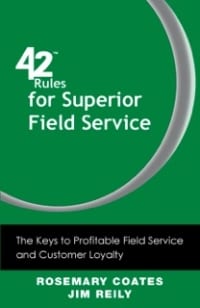 You will build customer loyalty in field service — if your service is responsive and effective.
You will build customer loyalty in field service — if your service is responsive and effective.
No one wants a product to fail, but it happens. The way you deal with failure can create significant opportunity to enhance customer loyalty. But, if handled poorly, it gives your customers the excuse they need to buy from your competitors.
Your customer views product failure as an emergency, especially if it affects business operations. Take a dentist, for example. If his or her vacuum system stops working, the office must shut down until it is repaired. This is inconvenient for the dentist, the staff, and the patients. It also represents loss in business revenue until the system runs again. This kind of situation is high priority for field service organizations servicing dental offices.
Turn a Crisis Into an Opportunity
In industrial settings, when a product fails, you may have to deal with irate customers who have spent lots of money with your company. This can be a golden opportunity to show customers that you support them with speed and efficiency.
Field Service managers should follow these steps when first contacted by a customer with a problem:
- Empathize with the customer; do not make excuses.
- Don’t patronize or talk down to customers; this will only make the situation worse.
- Really listen to what the customer is telling you, take notes regarding the situation, and ask for clarification.
- Remain calm even if the customer is not.
- Apologize, if appropriate. Say something like, “I’m sorry you are frustrated; let’s see how we can resolve this situation.”
- Promise to try to fix the problem or to try to find a solution. This will ease the tension the customer has created. The customer is looking for a resolution. Then do what you promise.
- Answer confidently, and take responsibility for assisting, even if this means you must refer the case to someone else.
- Give the customer a time when you will get back in touch—one hour, four hours, one day, etc. Then be sure you call back at the appointed time. Keep following up at regular intervals until issues are resolved.
- Take action to get the customer operating as soon as possible, or obtain information and estimates when this will happen.
- Write clear, concise reviews of incidents. Document issues and resolutions. Keep notes about anything that may assist others who deal with the customer in the future.

Your customers know that things will break, but they will be upset anyway. Your ability to react quickly and efficiently is crucial.
Excerpted exclusively for SmartVan from the new book, 42 Rules for Superior Field Service, by Rosemary Coates and Jim Reily.

Share this: